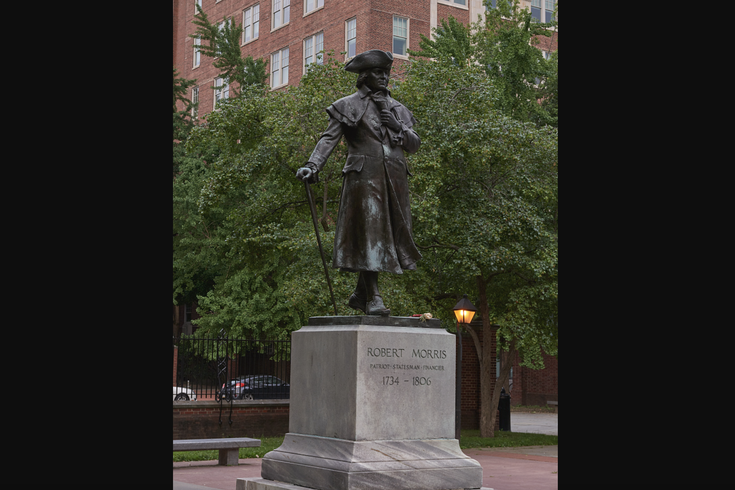
April 18, 2023
 Carol M. Highsmith/Library of Congress
Carol M. Highsmith/Library of Congress
The Robert Morris statue at the Independence National Historical Park was vandalized with the misspelled phrase 'human trafficer.' Park officials are working to have the graffiti removed. The photo above was taken in 2013.
Preservationists at Independence National Historical Park in Old City are working to remove graffiti from the base of the statue of Robert Morris, the Founding Father known as the "financier of the American Revolution."
The statue, located behind the Second Bank of the United States, recently was vandalized with the misspelled phrase "human trafficer." The phrase likely was written with a permanent felt marker, making it more difficult to remove than other markers or spray paint, park officials said in an Instagram post.
The statue's base is made of marble, a "porous stone that is aged and weathered," officials said. The park initially attempted to remove the graffiti by using gentle, non-abrasive chemicals. These chemicals are designed to remove ink from stone, but they only lightened the graffiti.
Independence National Historical Park then brought in a professional material conservator to use lasers to remove the graffiti. The lasers, which are non-abrasive, had a similar result. The conservator was able to further lighten the phrase, but the words are still clearly visible to those walking through the park.
"Professional conservators within and outside of NPS will explore and consider other methods and means to remove the graffiti," Independence National Historical Park officials wrote on Instagram. "Testing these methods will begin shortly. INHP will continue to tell comprehensive stories of the nation's history."
Independence National Historical Park, which includes Independence Mall and the Liberty Bell, is one of Philadelphia's most beloved historical sites. It includes exhibits replicating the Philadelphia homes of George Washington and John Adams, the gravesite of Benjamin Franklin, Washington Square, a portrait gallery in the Second Bank and statues of Washington, William Penn and other historical figures.
Morris was born in Liverpool, England in 1734. His father was a wealthy tobacco agent. He moved from Maryland to Philadelphia as a teenager to learn business and finance. He later inherited his father's estate.
In 1757, Morris and joined forces with Thomas Willing to form a trading company that shipped goods and participated in the slave trade. Willing was the son of Morris' mentor, former Philadelphia Mayor Charles Willing. In its Instagram post, the national park acknowledged that Morris amassed his wealth "by participating in shipping and property investments, including owning, trading, operating a plantation and auctioning enslaved Africans."
A staunch opponent of British taxation on American goods, Morris was nominated for the Second Continental Congress as a Pennsylvania delegate. Though he did not initially support American independence, Morris is one of several Founding Fathers whose names appear on all three major founding documents — the Declaration of Independence, the Articles of Confederation and the Constitution.
Morris used his business connections across the globe to help bankroll the American forces during the Revolutionary War, supplying Washington's army with gunpowder.
Morris left politics shortly after the war ended and founded a factory town along the Delaware River — Morrisville, Bucks County. He suffered financially in his later years, eventually landing in a debtors prison. When he was released, he lived in obscurity for five years until his death in 1806.
Morris is less known than the likes of Washington, Adams and Alexander Hamilton, but the "human trafficing" graffiti marks the latest protest against physical symbols of systemic racism.
During the civil unrest that followed the murder of George Floyd in 2020, Philadelphia removed the statue of former Mayor Frank Rizzo, who oversaw a police force notorious for its violence, and entered a legal battle over whether to remove the statue of Christopher Columbus from Marconi Plaza. In January, a court ruled that the plywood box covering the statue of the explorer must be removed.
In the comments on the national park's Instagram post, some users called for the statue to be removed entirely.
"Probably should remove all statues of every historical figure to be honest," a New Jersey user commented. "Just put up plaques. All great powers throughout history are made on the blood and sweat of the less fortunate."
Vandalizing or defacing property owned by the National Park Service is a federal crime punishable by up to six months in prison or a $500 fine, according to FindLaw.